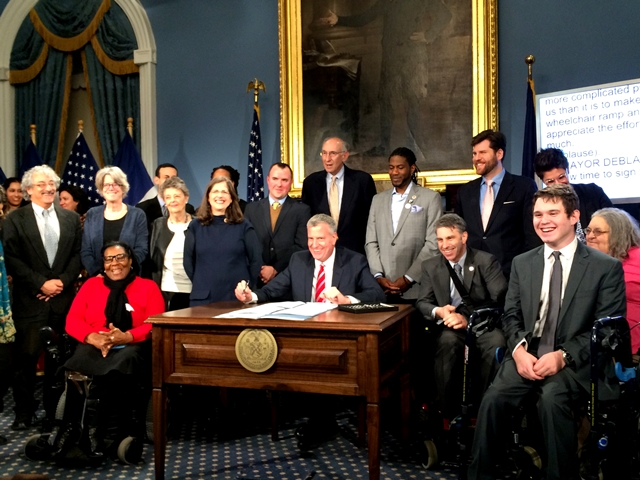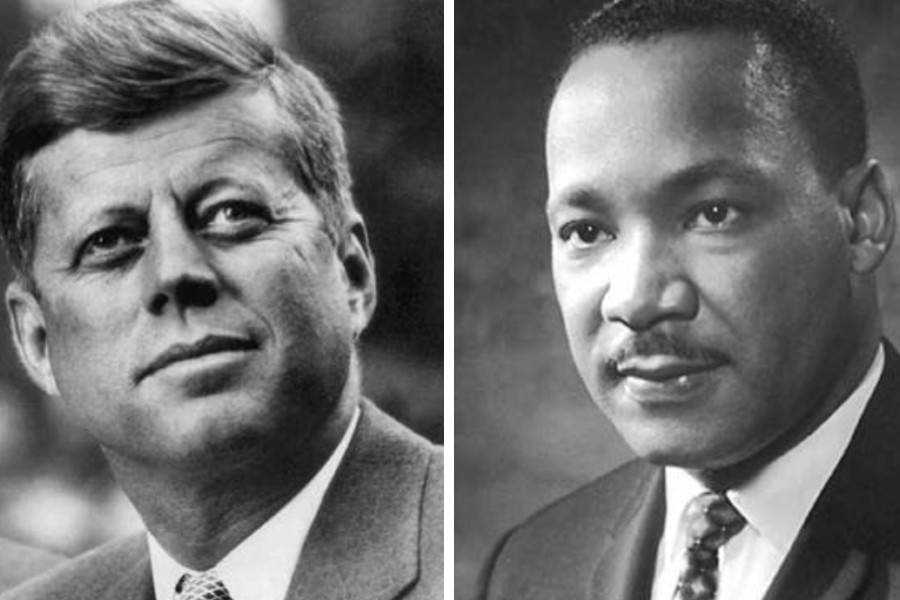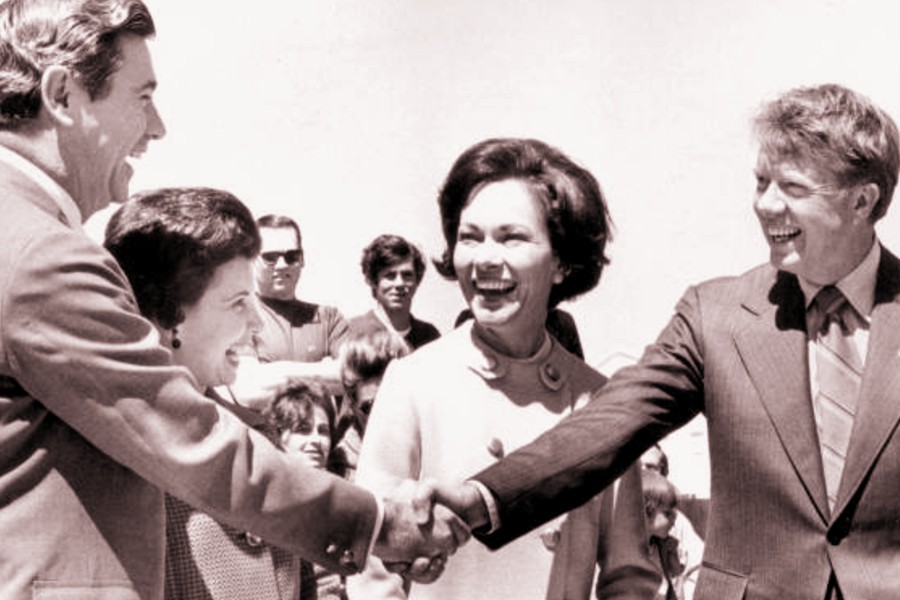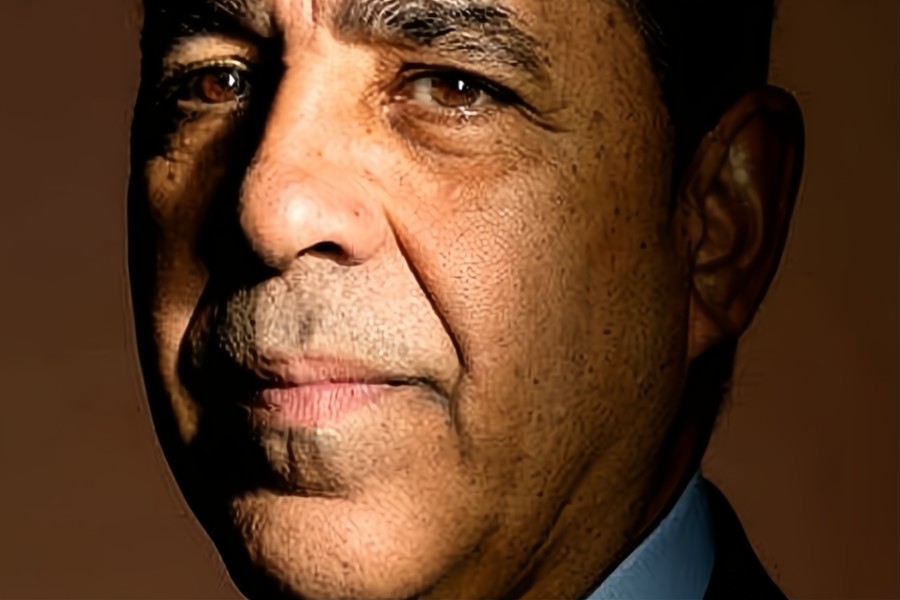 Today Mayor Bill de Blasio signed into law Council Members Helen Rosenthal and Ritchie Torres’ legislation to expand access for people with disabilities attending events held by the City and interacting with city agencies.
Today Mayor Bill de Blasio signed into law Council Members Helen Rosenthal and Ritchie Torres’ legislation to expand access for people with disabilities attending events held by the City and interacting with city agencies.
According to the Mayor’s Office for People with Disabilities, over 800,000 New Yorkers (10%) have disabilities.
The legislative package, which includes two bills, will do the following:
Int. 883-A: Require that all publicity materials for public events hosted by the City include accessibility information and a contact to coordinate accessible accommodations
Many public events do not currently publicize accessibility information. The bill would require all publicity materials for public events held by the City to include the following:
- Accessibility information
- A contact name, phone number, and email address to request accessible accommodations
- A deadline by which to make accessibility requests
The symbols, some of which are above, would provide accessibility information to the following communities:
- People with physical disabilities:
- Wheelchair Accessibility
- People with a hearing impairment:
- Assistive Listening Systems, including but not limited to hearing loops, for people with hearing loss
- Telephone Typewriter (TTY)
- American Sign Language interpretation (ASL)
- Communications access real-time translation (CART)
- People with a visual impairment:
- Accessible Print, size 18 or larger
- Low Vision Access
- Braille
Int. 881-A: Require that a qualified Disability Service Coordinator be employed at every city agency with contact information posted online
This bill would require all city agencies to have an employee responsible for coordinating compliance with the Americans with Disabilities Act (ADA) and investigating ADA complaints. The bill would also require the names and contact information for Disability Services Coordinators of city agencies to be posted online.
Currently, the Department of Transportation (DOT), Parks Department, and Human Resources Administration (HRA), the Department of Buildings (DOB), the Taxi & Limousine Commissioner (TLC), and the Office of Emergency Management (OEM) have someone performing these responsibilities, but only DOT, Parks, and HRA have information to contact these employees available online.
Several agencies are in the process of hiring a Disability Services Coordinator, including the Department of Housing Preservation and Development (HPD), the Department of Education (DOE), the Department of Design and Construction (DDC), the Board of Elections (BOE), the Department of Small Business Services (SBS), and the Department of Homeless Services (DHS).
“Disability rights are civil rights, and for too long our City has looked the other way when it comes to accommodating people with disabilities. 10% of New Yorkers have a disability – be it a physical disability, hearing or visual impairment – and it is our responsibility to serve these New Yorkers as best we can. 25 years after the passage of the Americans with Disabilities Act (ADA), New Yorkers with disabilities continue to face barriers to full participation in civic life and in interactions with City agencies. Today’s legislation is a step towards equal access for all,” said Council Member Helen Rosenthal, co-prime sponsor of the bills.
“The issue of accessibility and disability is one that is often ignored because many of us don’t have to deal with it on a daily basis. Accessibility to city resources is a constant problem for thousands of disabled New Yorkers, and through these two bills we are rectifying that. If these two bills are signed into law, every city agency will have to designate an employee that will coordinate that agency’s compliance with the ADA and all public city events will have to advertise information regarding accessibility at the event. These are solutions that will make life easier for disabled New Yorkers that must deal with other obstacles. I applaud Council Member Rosenthal for leading the charge and pushing these bills in the Council, and I’m proud to have been a partner throughout the legislative process,” said Council Member Ritchie Torres of the Bronx, co-prime sponsor of the bills.
“For the past 25 years we have fought to make New York more accessible for people living with disabilities. That fight continues under this legislation, ensuring that people living with disabilities are able to attend city-sponsored events and are represented within city agencies. The City has been and continues to be a leader in enacting ADA related accommodations to provide equal access for all New Yorkers,” said Council Member Andrew Cohen, Chair of the Committee on Mental Health, Developmental Disability, Alcoholism, Substance Abuse and Disability Services.
“Passage of these two bills will give the one in five New Yorkers over age 12 and one in three over age 65 who struggle with hearing loss a better chance to understand what is said at meetings and events across the City,” said Jerry Bergman, a leading advocate for hearing accessibility. “Many of us have stopped attending events because they typically are held in venues without assistive listening systems, such as permanently installed hearing induction loops, or real time captioning, and because most systems in place today are of inferior technology and do not work for those with severe hearing loss,” he added. “We are hopeful that this legislation will promote better understanding among City officials that hearing loss is the most common disability among its citizens and lead to our gaining increased access to public life.”
“People can become disabled at any point in their lifetime, but the frequency of disabilities increases with age – as does participation in public events for many. AARP believes it is essential that we provide the means for everyone to participate fully in all aspects of civic engagement. AARP is pleased that Councilwoman Rosenthal and the City Council are tackling this important issue,” saidChris Widelo, Associate State Director, AARP New York.
“New York City’s public meetings and events are important components of a vibrant and productive civic life. For people with disabilities, simple fixes through accommodations like the ones proposed by Council Member Rosenthal can promote equality and inclusion in civic affairs. Addressing the accommodation needs of people who are hard of hearing or for those who need materials in alternate formats is the right thing to do. We commend Councilmember Rosenthal for her initiative and join with her in urging the City Council to adopt this package of legislation,” said Monica Bartley, Community Outreach Organizer, Center for Independence of the Disabled, New York (CIDNY).
“It’s a tough fact that people with disabilities have challenges many of us cannot fathom. However, the tragedy is that the general public is often not even aware of those challenges. It is imperative that we pass this critical legislation – for without it, the issues which create a lack opportunity for progress, change, and equal access to what our city has to offer will never find their way to the table, let alone be addressed,” said Richard Ellenson, CEO of the Cerebral Palsy Foundation.
“As the representative organization of 9,000 college students with disabilities, the CUNY Coalition for Students with Disabilities (CCSD) seeks to ensure equal access to University and community life through staunch advocacy and vigorous civic engagement. The legislative package introduced by Council Member Rosenthal will empower CUNY students with disabilities by ensuring that we can fully participate in all meetings and events held or sponsored by City government and agencies,” saidSamantha Wong, Chair of the CUNY Coalition for Students with Disabilities.
“The Harlem Independent Living Center applauds Council Member Helen Rosenthal for her ongoing efforts regarding ADA bills Int. 881 and 883. We are confident the Council will vote in the affirmative for both bills providing members of the disabled community full access to events held by the City.” said Christina Curry, Executive Director of the Harlem Independent Living Center.
“The Hearing Loss Association of America and the New York City Chapter of HLAA urge the City Council to approve Int. 883 and Int. 881, introduced by Council Members Helen Rosenthal and Ritchie Torres. These bills would allow equal access to public meetings to those with disabilities, including hearing loss. For too long, people with hearing loss have been essentially left outside meeting room doors, because they were unable to hear the proceedings. Even when announcements were made that hearing accommodations would be provided, it was always unclear whether they would be in place. Int. 883’s requirement that publicity materials include accessibility information will help to resolve that uncertainty. It’s long past time an ADA coordinator position was established to help all people with disabilities get the access they need in NYC and we also urge passage of Int. 881. These bills are an important step in ensuring equal access for people with all disabilities, including hearing loss, to city agencies and city-hosted events. We thank Council Members Rosenthal and Torres for their leadership in promoting equal access for people with disabilities, including hearing loss,” saidKatherine Bouton, President of the Hearing Loss Association of America’s New York City chapter and a member of the board of Hearing Loss Association of America.
“The comprehensive legislative package that Council Member Rosenthal is introducing is a common sense approach that will ensure New York City complies with ADA regulations and will set the standard for how government relates to people with disabilities. I commend and thank her for her leadership and commitment to people with disabilities,” said Alan R. Morse, JD, PhD, President & CEO, Lighthouse Guild.
“The National Multiple Sclerosis Society New York City-Southern New York Chapter supports all legislation, policies and regulations that will improve accessibility in New York City. It is important that everyone who resides in or visits our city be able to access all that it has to offer,” said Robin Einbinder, President for the National Multiple Sclerosis Society, New York City – Southern New York Chapter.
“Councilwoman Rosenthal’s and Councilman Torres’ sponsored legislation Int. 881 and 883 addresses an ongoing problem for New Yorkers with disabilities with access to information in their format of choice. In addition physical and information access to city events and buildings must be addressed as well. Having a Disability Services Coordinator at each city agency and accessible information on how to reach that coordinator is a step forward toward meeting the needs all New Yorkers,” said VISIONS Executive Director/CEO Nancy D. Miller.
“People with disabilities have been left out of the conversation too often when it comes to government policy making. These bills are a step in the right direction to providing accessibility to people with disabilities at public forums relating to government affairs. Importantly, these bills require that all City agencies have someone with disability issues in mind working alongside those in the government who are making the decisions that impact our community. For these reasons and others, we support this legislation,” said Alex Elegudin, President of Wheeling Forward.
“For the last 33 years, Hands On has provided and promoted access for Deaf and hard of hearing audiences in NYC’s rich cultural arts community. The need for clear and accurate accessibility information by appointing a designated contact person and using appropriate signage is vital to the inclusion of the disability community. I also stress that there is a need for better communication between organizations and the disability community – to make people aware of the accessibility services and programs offered. As the cultural capital of the world, we support and applaud Council Member Helen Rosenthal’s efforts to promote access and inclusion for all people with disabilities to participate in our wonderful arts and cultural scene,” said Beth Prevor, Executive Director of Hands On.
Become a Harlem Insider!
By submitting this form, you are consenting to receive marketing emails from: . You can revoke your consent to receive emails at any time by using the SafeUnsubscribe® link, found at the bottom of every email. Emails are serviced by Constant Contact








